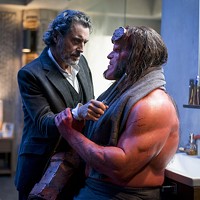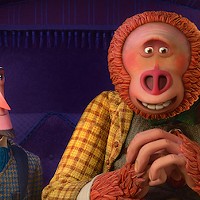

BEOWULF (2007). Not exactly your grandfather's Beowulf, this played at select venues last winter in Digital 3D, resulting in a positively astonishing experience. Tossed coins rolled directly toward the camera, spears poked out at audience members, and even an animated Angelina Jolie's, umm, assets seemed more pronounced than usual. Certainly, the technology exists to offer a 3D Beowulf on DVD, but unfortunately, Paramount Pictures didn't even bother, releasing the film in the standard flat format. Luckily, the movie is strong enough to survive without the enhancement. Director Robert Zemeckis, whose 2004 The Polar Express felt like an animated feature that had been embalmed, again employs the "performance capture" technique with far greater success, overlaying real actors with a cartoon sheen and placing them in the middle of a CGI landscape. Based on the ancient poem, the script by Neil Gaiman and Roger Avary doesn't always match the movie's visual splendor, but their modifications to the text are more often than not respectful. After the gruesome monster Grendel (snarled by Crispin Glover) wreaks havoc on the castle of King Hrothgar (Anthony Hopkins), the heroic (and boastful) Beowulf (Ray Winstone) arrives to save the day. Yet he finds himself not only having to confront Grendel but also the misshapen creature's mother (Jolie) and, in the climactic piece de resistance, a fierce dragon. Given the massive advances in 3D technology, it's possible that more and more movies will be presented in this format, which in turn will inspire studios to transfer them to DVD in that manner. Anyone up for Shortbus 2 in Digital 3D?
Extras on the unrated Director's Cut include several deleted scenes, various making-of pieces breaking down the movie's effects and art designs, and a look at the Beowulf legend.
Movie: ***
Extras: ***
IN THE VALLEY OF ELAH (2007). Writer-director Paul Haggis will forever be lambasted in many circles because Crash unfairly shanghaied Brokeback Mountain at the Oscars. But those quick to write him off as a pandering huckster tend to forget that he also penned the exquisite screenplays to two Clint Eastwood triumphs, Million Dollar Baby and Letters From Iwo Jima. It's that Paul Haggis who shows up with this powerful drama that employs a murder-mystery template to camouflage what ultimately proves to be the picture's true intent: Examine the repercussions of war on the psyches of the youngsters we ask (or order) to defend us in battle. Tommy Lee Jones, in a superlative performance, stars as Hank Deerfield, a retired officer trying to find out why his son went AWOL upon returning from a tour of duty in Iraq. Once it's ascertained that the boy was murdered, the morose father teams up with an equally glum detective (Charlize Theron) to solve the case. On its own terms, the mystery is presented in a satisfying matter, and only those expecting an elaborate Agatha Christie-style unmasking of the killer will be disappointed in this aspect of the plot, which wraps up well before the actual movie does. Clearly, Haggis' main story is about the toll that the Iraq War – and, by extension, all battles, especially those (like Iraq) created for bogus reasons – takes not only on the soldiers sent to participate in the bloodshed but also on their families and friends. The film attempts to depict the manner in which the specter of war can follow a soldier back to civilization and inform every subsequent decision and action, and Haggis should be saluted for taking this angle further than most.DVD extras include a 43-minute making-of documentary and one additional scene.
Movie: ***1/2
Extras: **
THE LAST EMPEROR (1987). Bernardo Bertolucci's The Last Emperor is an epic in every sense except one: As depicted here, its protagonist is a small figure, one who had greatness (or at least a facsimile thereof) thrust upon him, rather than a man who would in any meaningful way be allowed to control his own life. Near the start of the 20th century, 3-year-old Pu Yi becomes the emperor of China. As a lonely teen who's essentially kept prisoner within the walls of the Forbidden City, he learns that his country's changing winds have rendered him nothing more than a figurehead; once he becomes an adult (played at this point by John Lone), he finds himself ousted from the only home he's ever known and subsequently moving through a variety of roles, among them a puppet for the Japanese government, a Western-styled playboy, a political prisoner of the Communists and, finally, a humble gardener. To call The Last Emperor a magnificent visual achievement almost seems like an understatement, but this is no dusty, dull biopic that's forced to solely fall back on its good looks: Despite the often impenetrable nature of Pu Yi, the performances of the various actors who play the role humanize this character, and Bertolucci and co-scripter Mark Peploe locate the sorrow in this story about a person who became a pawn of history itself. Peter O'Toole appears in a choice role as Pu Yi's sly Scottish tutor, and there's an exquisite music score provided by Ryuichi Sakamoto, Cong Su and Talking Heads' David Byrne. This went nine-for-nine at the Academy Awards, winning every award for which it was nominated (including Best Picture and Best Director).
In addition to the 165-minute theatrical version, Criterion's four-disc DVD set also contains the 218-minute television cut. Other extras include audio commentary by Bertolucci, Peploe, Sakamoto and producer Jeremy Thomas, new and vintage documentaries exploring the making of the movie, a 1989 interview with Bertolucci, a new interview with Byrne, and a 98-page booklet.
Movie: ***1/2
Extras: ****
MICHAEL CLAYTON (2007). Michael Clayton plays like Erin Brockovich without the populist appeal – it centers on the title character (George Clooney), a law firm "fixer" who's always called upon to clean up messy problems for the company's clients. Hating his job but stuck with it due to massive debts and an expensive divorce, Michael finds himself caught in the middle when Arthur Edens (an excellent Tom Wilkinson), Michael's good friend and the firm's best attorney, seemingly goes bonkers and threatens to derail their most important case: defending an agrochemical company against a lawsuit filed by ordinary citizens. Michael's boss (Sydney Pollack) orders him to talk some sense into Arthur, but it turns out that the agrochemical company's chief counsel (Tilda Swinton) is willing to go to more extreme lengths to silence the wayward lawyer. Tony Gilroy, adapter of the Jason Bourne novels, makes his directorial debut here (as well as writing the script), and it's an assured first effort. Almost everything about the movie is muted – the settings, the exchanges, the emotions – and this decision gives the story a real-world gravitas that makes the odious executive actions seem even more plausible than they already are. Gilroy steadfastly avoids including anything that can be deemed extraneous or overreaching, preferring to rest his faith – and the picture's fate – in the hands of his accomplished actors and in the strength of his own script. There are no real surprises in Michael Clayton, just the awareness of a job well done.
DVD extras include audio commentary by Tony Gilroy and editor John Gilroy, and five minutes of deleted scenes.
Movie: ***
Extras: **
RENDITION (2007). What's the point of tackling a real-life hot-button issue if everything about it is presented in an only-in-Hollywood style of fantasy filmmaking? The post-9/11 topic on hand is "extraordinary rendition," which allows the U.S. government to send suspected terrorists to other countries in order to be interrogated. Since the Bush administration has no qualms about torturing any foreigner whose skin is darker than, say, Nicole Kidman's, it's a viable and volatile subject for a movie to tackle, but this does so in the most simplistic manner possible. Reese Witherspoon plays Isabella, a pregnant mom whose Egyptian-born, U.S.-raised husband (Omar Metwally) has disappeared without a trace, snatched at the Washington, D.C. airport for his suspected part in a bombing. The U.S. government's evidence is feeble, but Senator Whitman (Meryl Streep, not particularly effective) decides that's all the proof she needs to ship him off to be subjected to all manner of pain. The American analyst (Jake Gyllenhaal) assigned to preside over the torture finds the treatment shocking; meanwhile, Isabella seeks help from a former college fling (Peter Sarsgaard), who just happens to be the assistant to a senator (Alan Arkin) who works closely with Whitman. As if this weren't all convenient enough for the sake of tidy storytelling and tentative armchair liberalism, there's also a plot thread involving a love affair between a terrorist and the daughter of the head of the torture unit. Coupled with a narrative "Gotcha!" more suited to Memento, it all adds up to a dilution of the real issues at hand. With friends like this movie, who needs Dick Cheney?
DVD extras include audio commentary by director Gavin Hood, the half-hour documentary Outlawed, a half-hour making-of feature, four deleted scenes and an alternate ending.
Movie: **
Extras: ***
WALKER (1987). Roger Ebert gave it zero stars (TV partner Gene Siskel was equally scathing). Leonard Maltin slapped it with a BOMB rating. And USA Today's Mike Clark included it on his year-end "10 Worst" list, pairing it with director Alex Cox's other 1987 offering, Straight to Hell. And these reviews were just the tip of the iceberg – no wonder I was hell-bent back in the day to catch a movie that immediately gained such notoriety as it was barely being released to theaters (according to www.IMDb.com, it grossed a ground-scraping $257,000 against a $5.8 million budget). Whether a Charlotte theater ever hosted the film or I had to wait and catch it on video remains lost in my memory banks, but my hope of finding perverse pleasure where others only found pain failed to come to fruition: This movie truly was torturous. A fresh viewing two decades later has revealed that the picture has improved only a smidgen – its points about American imperialism seem as pertinent and noteworthy today, but its satiric take on the subject remains as obvious and ham-fisted as it did back when it premiered. Although it centers on William Walker (Ed Harris), the 19th-century adventurer who overthrew the Nicaraguan government and set himself up as the country's president, Cox and screenwriter Rudy Wurlitzer (Two-Lane Blacktop) meant for their work to serve as an indictment of the Reagan administration's illegal dealings with that country's terrorists throughout the 1980s – and this new Criterion release of the film seems timed to further point out similarities with the insidious Bush administration's exploits in Iraq. But for all its admirable intentions, Walker is a chore to endure, and even the deliberate anachronisms (Coke bottles, Newsweek magazines and a helicopter are among the items that appear over the course of the film) reek of desperation rather than inspiration. Only the excellent score by The Clash's Joe Strummer escapes the monotony that settles over the rest of this strident picture.
DVD extras include audio commentary by Cox and Wurlitzer, a making-of documentary, behind-the-scenes photos, and an amusing bit in which Cox pores over several of the original reviews of his film.
Movie: *1/2
Extras: **1/2


